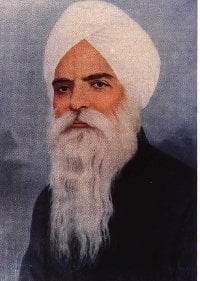Template:AOW240: Difference between revisions
Hari singh (talk | contribs) No edit summary |
Hari singh (talk | contribs) No edit summary |
||
| Line 2: | Line 2: | ||
[[Image:Bhaivirsingh.jpg|thumb|right|300px|Bhai Vir Singh]] | [[Image:Bhaivirsingh.jpg|thumb|right|300px|Bhai Vir Singh]] | ||
'''Bhai Vir Singh''' (December 5, 1872 - '''June 10''', 1957) was a poet, scholar and theologian who was a major figure in the movement for the revival and renewal of [[Punjabi]] | '''[[Bhai Vir Singh]]''' (December 5, 1872 - '''June 10''', 1957) was a poet, scholar and theologian who was a major figure in the movement for the revival and renewal of [[Punjabi]] literary tradition. His identification with all the important concerns of modern [[Sikhism]] was so complete that he came to be canonized as Bhai, the Brother of the [[Sikh]] Order, very early in his career. For his pioneering work in its several different genres, he is acknowledged as the creator of modern [[Punjabi]] literature. | ||
Born on 5 December 1872, in [[Amritsar]], Bhai Vir Singh was the eldest of Dr Charan Singh's three sons. The family traces its ancestry back to Diwan Kaura Mall (d. 1752), who rose to the position of vice-governor of Multan, under Nawab Mir Mu'ln ul-Mulk, With the title of Maharaja Bahadur. | Born on 5 December 1872, in [[Amritsar]], Bhai Vir Singh was the eldest of Dr Charan Singh's three sons. The family traces its ancestry back to Diwan Kaura Mall (d. 1752), who rose to the position of vice-governor of Multan, under Nawab Mir Mu'ln ul-Mulk, With the title of Maharaja Bahadur. | ||
Baba Kahn Singh (1788-1878) was, perhaps, the first in the family to become a Sikh. He became a recluse when he was still in his early teens and spent his entire youth in monasteries at | [[Baba Kahn Singh]] (1788-1878) was, perhaps, the first in the family to become a [[Sikh]]. He became a recluse when he was still in his early teens and spent his entire youth in monasteries at [[Hardwar]] and then at [[Amritsar]] acquiring training in traditional [[Sikh]] learning. His mother's affection ultimately reclaimed him to the life of a householder at the age of 40, when he got married. Adept in versification in [[Sanskrit]] and [[Braj]] as well as in the oriental system of medicine, [[Baba Kahn Singh]] passed on his interests to his only son, [[Dr Charan Singh]]. {{Aowf|Bhai Vir Singh}} | ||
Revision as of 08:53, 10 June 2009
Bhai Vir Singh (December 5, 1872 - June 10, 1957) was a poet, scholar and theologian who was a major figure in the movement for the revival and renewal of Punjabi literary tradition. His identification with all the important concerns of modern Sikhism was so complete that he came to be canonized as Bhai, the Brother of the Sikh Order, very early in his career. For his pioneering work in its several different genres, he is acknowledged as the creator of modern Punjabi literature.
Born on 5 December 1872, in Amritsar, Bhai Vir Singh was the eldest of Dr Charan Singh's three sons. The family traces its ancestry back to Diwan Kaura Mall (d. 1752), who rose to the position of vice-governor of Multan, under Nawab Mir Mu'ln ul-Mulk, With the title of Maharaja Bahadur.
Baba Kahn Singh (1788-1878) was, perhaps, the first in the family to become a Sikh. He became a recluse when he was still in his early teens and spent his entire youth in monasteries at Hardwar and then at Amritsar acquiring training in traditional Sikh learning. His mother's affection ultimately reclaimed him to the life of a householder at the age of 40, when he got married. Adept in versification in Sanskrit and Braj as well as in the oriental system of medicine, Baba Kahn Singh passed on his interests to his only son, Dr Charan Singh. .....More

